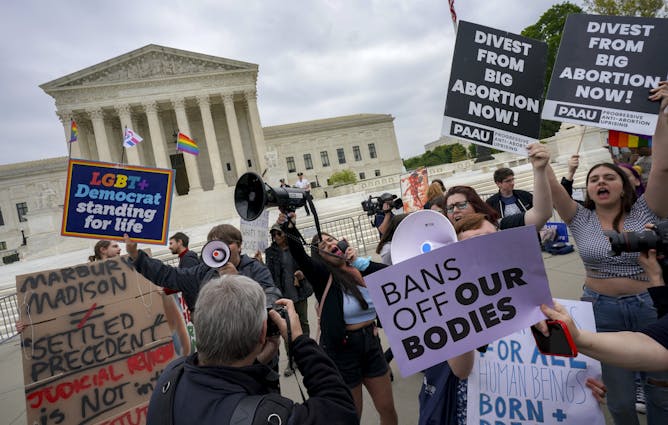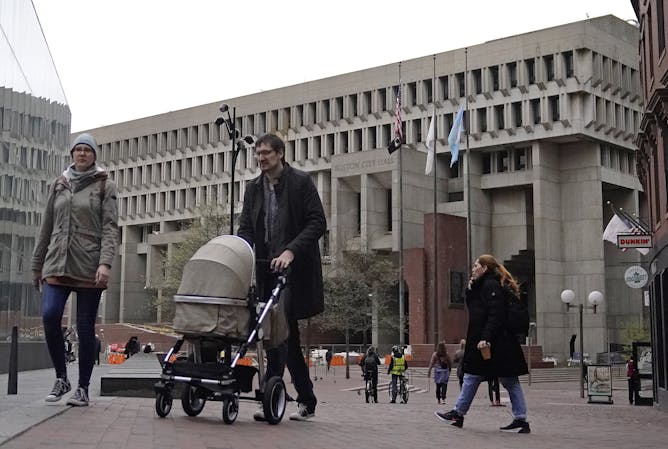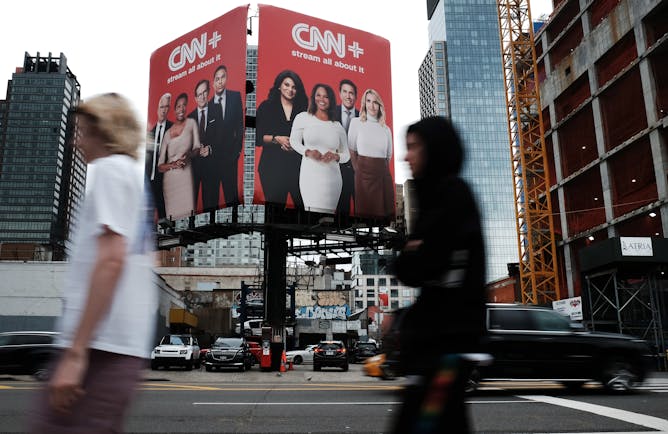|
|
|
|
After pivoting much of our politics coverage in late February to the developing war in Ukraine, this week saw a bombshell of another sort: the possible overruling of two landmark abortion rights rulings at the Supreme Court, including Roe v. Wade. As anyone not in a cave without Wi-Fi knows by now, a leaked draft of an opinion by Justice Samuel Alito showed that a majority of the justices were likely to rule that the right to an abortion is no longer guaranteed by the Constitution.
Among the many stories we have published since the news broke is “If Roe v. Wade is overturned, there’s no guarantee that people can get abortions in liberal states, either.” Authors Amanda Jean Stevenson from the University of Colorado Boulder and Kate Coleman-Minahan at University of Colorado Denver describe how in recent months, even before the leak was made public, state after state passed highly restrictive abortion laws and, in response, “liberal
policymakers” in other states “are quickly positioning their states as abortion havens.”
But “people from states that could ban abortion may not be able to easily get an abortion in more liberal places,” they write. There’s a financial obstacle: state laws that allow private health insurance providers to exclude abortion from their covered services. Then there are the delays in getting an abortion because of increased demand, which could slam up against bans on abortions later in pregnancy, all of which could end up making a person ineligible for an abortion.
|

|
Naomi Schalit
Senior Editor, Politics + Society
|
|

Anti-abortion protesters use bullhorns to counter abortion rights advocates outside the Supreme Court on May 3, 2022.
Bonnie Jo Mount/The Washington Post via Getty Images
Amanda Jean Stevenson, University of Colorado Boulder; Kate Coleman-Minahan, University of Colorado Denver
25 states aren’t expected to ban abortion if the Supreme Court overturns Roe v. Wade. But limits on abortion in these places, too, make it an uncertain refuge for people seeking abortions elsewhere.
|

Pedestrians walk near three flag poles flying the American flag, the Commonwealth of Massachusetts flag, and the City of Boston flag, from left, outside Boston City Hall, May 2, 2022.
AP Photo/Charles Krupa
Mark Satta, Wayne State University
The Supreme Court ruled May 2, 2022, in Shurtleff v. Boston, a free speech case.
|

CNN’s hyped streaming service folded after three weeks.
Spencer Platt/Getty Images
Nolan Higdon, California State University, East Bay
Since the 2020 election, the slide in ratings for many large networks has been particularly acute. What’s driving this exodus, and where are viewers going?
|
|
|
-
Andreas Johansson, Lund University
The country has a long history of ethnic and religious conflict, but the worst economic crisis in decades has brought protesters together.
-
Robert Deam Tobin, Clark University
Politics have never been that far away from the Eurovision Song Contest. Since its inception, the annual event has reflected the political culture and geopolitical realities of Europe.
-
Morgan Marietta, UMass Lowell
If the Supreme Court guts landmark rulings that established a constitutional right to abortion, the legal struggle will shift to statehouses and state courtrooms.
-
Eric Bellone, Suffolk University
A series of Supreme Court cases based on racist language and reasoning still govern the lives of 4 million Americans.
-
Linda C. McClain, Boston University
President Joe Biden has urged lawmakers to act over abortion rights should the Supreme Court overturn Roe v. Wade. But is there a route to legislation?
-
Karen Jacobsen, Tufts University
A young woman in Lviv, Ukraine, writes about fleeing Russian aggression not once, but twice, since 2014 and explains the fierce desire to stay in her home country – a desire shared by many.
-
Paul B. Stephan, University of Virginia
The US has frozen tens of billions of dollars worth of assets belonging to Russians and their government. A legal scholar explains why confiscating them is a bit trickier.
-
Connie L. Schaffer, University of Nebraska Omaha; Martha Graham Viator, Rowan University; Meg White, Stockton University
In the early 1960s, the McDonogh 19 school was the site of fierce opposition to racial integration. The building is now owned by one of the Black girls who first integrated the school.
|
|
|
Like this newsletter? You might be interested in our other weekly emails:
|
| |
| |
| |
| |

|
| |
| |
| |
| |
| |
| |
|
|
|
|
|
|
|